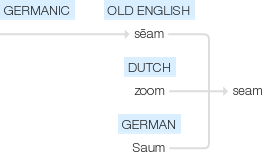Seam
Old English sēam, of Germanic origin; related to Dutch zoom and German Saum .
wiktionary
From Middle English seem, seme, from Old English sēam(“seam”), from Proto-West Germanic *saum, from Proto-Germanic *saumaz(“that which is sewn”).
From the noun seam.
From Old English sēam(“a burden”), from Latin sagma(“saddle”).
From Middle English seime(“grease”), from Old French saim(“fat”). Compare French saindoux(“lard”).
etymonline
seam (n.)
Old English seam "seam, suture, junction," from Proto-Germanic *saumaz (source also of Old Frisian sam "hem, seam," Old Norse saumr, Middle Dutch som, Dutch zoom, Old High German soum, German Saum "hem"), from PIE root *syu- "to bind, sew."
Chidynge and reproche ... vnsowen the semes of freendshipe in mannes herte. [Chaucer, "Parson's Tale," c. 1386]
Meaning "raised band of stitching on a ball" is recorded from 1888. Geological use is from 1590s.
seam (v.)
1580s, from seam (n.). Related: Seamed; seaming.
